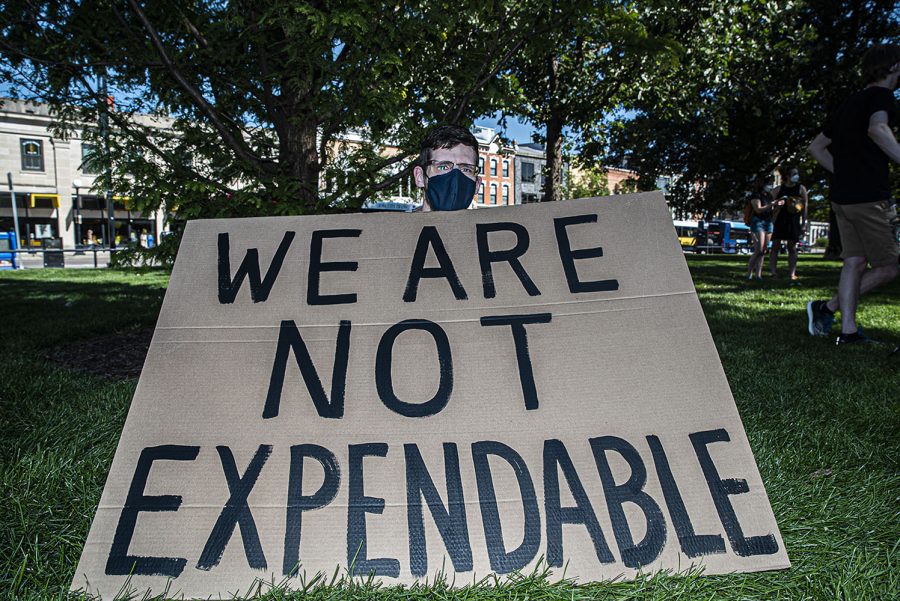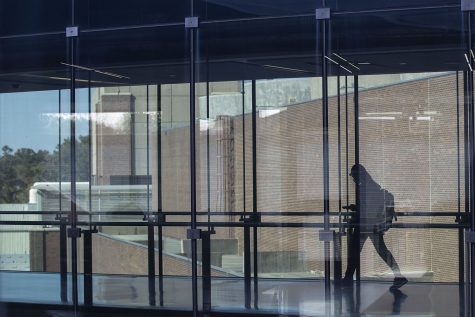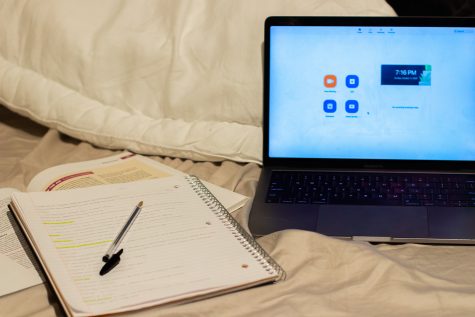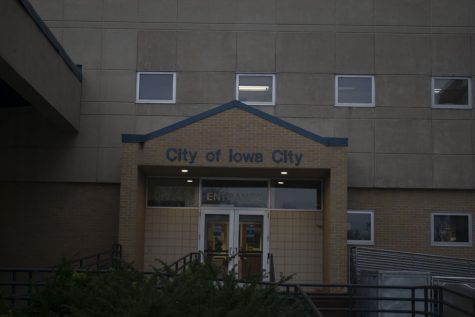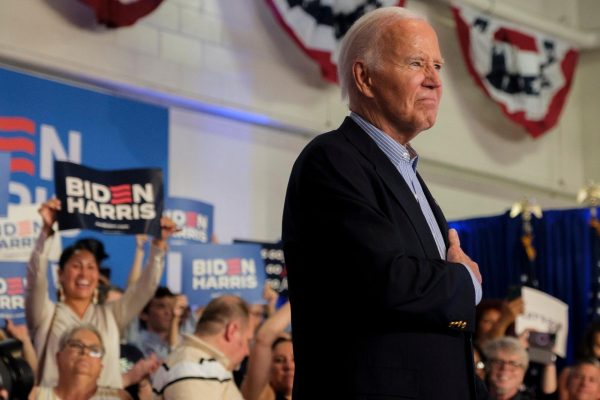Unions at Iowa universities vote to recertify for bargaining power, frustrated with election process
Following a 2017 change in Iowa law, university unions in the state are gearing up for their first recertification election, causing frustration.
University of Iowa graduate student Drew Etienne poses for a portrait in downtown Iowa City on Wednesday, Aug. 19, 2020. The Campaign to Organize Graduate Students (COGS) led a march to President Bruce Harreld’s home in order to protest the administration’s insistence that the university remain open despite the health risk posed by COVID-19.
When Elizabeth Handschy decided she wanted to earn a Ph.D. in anthropology, she knew it wouldn’t be easy. But she never expected that continuing her education would be in jeopardy every other year.
In 2017, the Iowa Legislature passed a law that changed how unions attain collective bargaining power. Instead of being able to negotiate indefinitely, unions must hold a recertification vote every time a contract is renegotiated.
To remain certified, more than 50 percent of the union must vote yes. Any member who chooses not to vote, turns into an automatic ‘no’ vote.
With recertification votes occurring every time a union renegotiates contracts, union members might forget when the elections happen. Union sizes also change drastically, requiring more time and work to contact every union member. Because the vote needs to be the majority of the union members’ voting yes rather than only the majority of the people who voted — like in a typical election — the vote demands the responses of more people to be successful.
Because of differences in contract negotiations for various occupations and employers, there is no set repetition for all unions to recertify. Unions vote whenever their individual organization restarts contract negotiations.
Handschy, the press and publicity chair of the University of Iowa’s Campaign to Organize Graduate Students, said this October will be the third time since the union’s founding in 1993 that the union has ever had to argue for their bargaining ability — which Handschy attributes to as the reason she can access higher education. COGS’ election started Oct. 13 and will end Oct. 27 — when they’ll find out whether they can continue as a union.
RELATED: New union contract means wage increase, elimination of professional standards
“If we didn’t have a salary based on the cost of living in Iowa City and we didn’t get consistent raises with our contracts and tuition coverage and health insurance, it wouldn’t be possible for me to be in graduate school,” she said. “I couldn’t afford it without the work COGS does. There are a lot of people who are in that same position. The university is accessible to a wider variety of graduate workers because of what the union has achieved. If that goes away because we don’t recertify, the university would not be the intellectual community that it is now.”
President of United Faculty Becky Hawbake, who leads the union at the University of Northern Iowa, said the process is also expensive for unions, which makes it difficult to ensure union members can participate in elections.
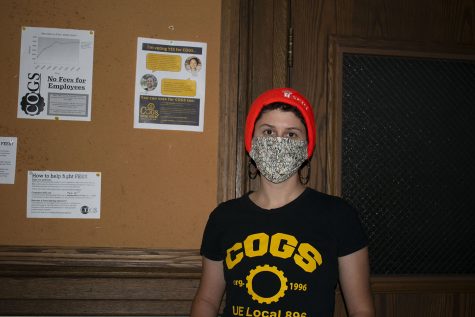
Iowa law requires unions to pay $1.50 for every member when conducting a recertification election. Since United Faculty has 566 members, they pay an $850 fee in order to maintain their ability to negotiate contracts.
Every time a contract is renegotiated, any union must pay whatever the fee is for the size of their union. Since COGS has more than 1,800 members, they have to pay almost $2,000 every other year when contracts are arbitrated.
Handschy said this fee makes it difficult to pay for other things that the union needs.
“Normally, our money goes to any grievances that need to be dealt with and taken through more procedures with the state [government],” she said. “It goes to fees and staff that help run our union. It goes to negotiations and office space in order to serve almost 2,000 people. So the $2,000 we have to pay puts a huge financial strain on the union alongside all the time we have to spend on the election.”
The law not only changed the voting process; it made the only mandatory negotiation topic wages. UIHC registered nurse and SEIU #199 member Britney Bowen said this has allowed the state Board of Regents to take away other aspects that the union she is a part of has fought for for years.
She said she attended the regents meeting with the union to negotiate contracts after the bill was passed, and was shocked by how much was missing on the first read-through.
“They took everything out of our contract that we’ve been working for for the past 10, 20 years,” she said. “They put in base wages for new incoming employees and that was it. No pay raise for current employees, everything was gutted. And it was the biggest slap in the face, but they could do it because of the changes made by the 2017 law. That was the bare minimum they had to do.”
Bowen said this was the regents’ initial offer and they later did negotiate a pay raise for current employees. Senior Communications Director for the regents Josh Lehman said in an email to The Daily Iowan that the regents will follow the collective bargaining process when negotiating contracts this year.
“While base wages are the only mandatory topic of bargaining, the [regent] universities continue to provide a comprehensive benefits package, which is key to being able to recruit and retain quality employees,” he said. “Many protections that were previously a subject of collective bargaining have been added to the employee handbook and are still in place.”
Lehman said some of these protections include hours of work, supplemental pay, vacation, and sick leave.
The elections are being held Oct. 13-27 online. Members can call in to vote, so COVID-19 hasn’t impacted the election too much, Bowen said, but that isn’t her main concern.
As SEIU #199 is recertifying for the first time this fall since House File 291 was passed, the group is running into issues of contacting all of the union’s members, she said.
“I’m worried we won’t get the information out to everyone who needs it,” Bowen said. “I’ve been trying to talk to coworkers at work and everyone I’ve talked to seems to want to make their vote count, but the problem is getting the word out to 4,000 people…It’s scary because if people don’t vote, their vote is automatically a no and that’s decided for them from the start.”
The election structure is particularly difficult for units like COGS, Handschy said, because its members are constantly changing once students graduate and new ones are accepted to the UI.
“It’s particularly challenging for [COGS] because our base of workers changes at a rapid rate,” she said. “Some of our members weren’t on campus the last time we recertified, so we have to spend more time every year explaining the process …The majority of people who were familiar with the process have graduated. It’s more of an effort to keep members informed.”
Iowa Rep. Dave Deyoe, R-Nevada, is the chair of the House Labor Committee and helped pen the bill that changed how unions function. He said the intention of the bill was to allow unions to be more cognizant of what their workers want.
“Oftentimes, with the previous laws, union members hadn’t voted in years,” he said. “Sometimes since the law was passed in the 70s, no recertification vote had been held. The 2017 law was set up to give union members a bigger say and [an opportunity] to vote on their representation…What we also had in mind when writing the bill was the taxpayers and who they elect, specifically school boards, superintendents and people in those roles. We wanted to ensure they had a voice during negotiations as well.”
The Iowa Public Employment Relations Act passed in 1974 adapted the Iowa Code Chapter 20 laws surrounding collective bargaining. The Iowa Code Chapter 20 creates the procedures that establish bargaining units and regulate unions.
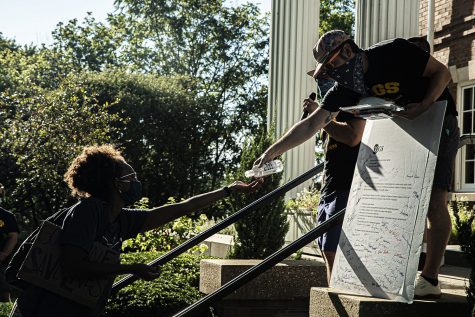
Since the bill’s passing in 2017, Deyoe said most unions have recertified. He’s aware that most unions dislike the measures the bill created, he said, but he believes it’s important to allow taxpayers and their representatives to also have a voice in the process.
Deyoe said the law was loosely inspired by a Wisconsin law when it comes to the voting process. However, he said the only thing taken directly from the law was about how unions can use arbitration.
President of SEIU #199 Cathy Glasson said she views this law as a way to restrict unions and take away bargaining ability from the people who need it the most. SEIU #199 represents more than 4,000 people across many disciplines, including nurses at University of Iowa Hospitals and Clinics.
It’s the first time her union is recertifying, Glasson said, so some people don’t know how the process works, which puts the union at risk of being unable to bargain because people don’t know the process — a risk she’s trying to mitigate with digital promotion.
“To make sure everyone knows about the election, we have a team of members and organizers making phone calls and engaging on social media in ways to avoid person-to-person contact during a pandemic,” she said. “We are having good conversations and looking at creative ways to ensure UIHC staff keep their union voice. People I’ve talked with are shocked when they learn that if they just don’t vote, it’s effectively an automatic no vote. I think once they hear that, the staff see it as unfair and it will likely encourage more people to vote.”
Glasson is not alone in this fear. Handschy said COGS is a necessity for several members. If the recertification ends in a negative vote on Oct. 27, she said the university would lose several graduate student workers.
“If we lost our contract and lost our ability to collectively bargain those contracts, graduate workers would definitely see a salary decrease,” she said. “It wouldn’t be tenable for a lot of people to stay in graduate school, which would be a loss to the university.”
The last time COGS and United Faculty had to recertify in 2018, both unions had more than 80 percent of their members vote in favor of maintaining bargaining ability, said Handschy and Hawbacker.
Hawbacker said she believes the elections and organizing has made United Faculty a stronger organization. As the elections begin, she said she hopes members have the same energy that they did in past years, but she is concerned there is too much going on in 2020 for members to prioritize the vote.
“This year, there are a million other things that people should be spending their time on,” she said. “I should be more focused on things our members need, but I have to focus on the elections, instead. It is important to stay in touch with our members, which is more time consuming now due to COVID-19 and the vote coming up, but time could be better spent advocating for members to solve real issues and doing more for the university as a whole. It’s a distraction from the most important issues.”
Regardless of the current circumstances, Glasson said this law has created a great risk to all workers — one that the public needs to know about.
“Without a union, the hospital and other employers will continue making changes unilaterally and workers will have no voice to advocate for their patients or themselves,” she said. “This election is an unnecessary attack on UIHC employees’ rights. It’s so important that UIHC staff and all of Iowa’s public employees who are voting, understand what’s at stake and vote yes. It’s the only way they can fight for their patients and the things they care about in their everyday lives.”

(she/her/hers)
Eleanor Hildebrandt is a senior at the University of Iowa majoring in journalism and mass communication and global health studies. She...
(she/her/hers)
Email: [email protected]
Raquele Decker is a Photographer and Videographer at The Daily Iowan. She is a junior at the University...



